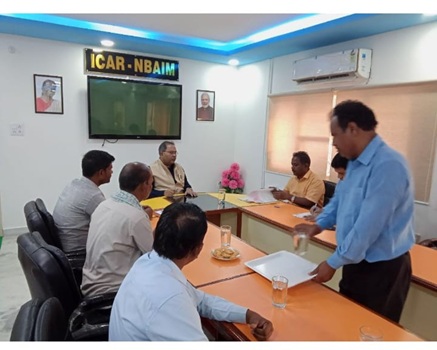In the rural heartland of Uttar Pradesh, where the rice-wheat cropping system dominates, crop residue management has long been a challenge. Every year, farmers face a short window between paddy harvest and wheat sowing, which often leads them to burn paddy stubbles in the fields. In Uttar Pradesh alone, approximately 20 million tonnes of paddy straw are generated annually, creating a significant environmental issue. While some of this crop residue is used for household energy and animal feed, much of it is wasted or incinerated. The adverse environmental effects and the loss of potential organic matter highlighted the need for a sustainable, on-farm solution. This is where the Rapid Composting Technology, developed by ICAR-National Bureau of Agriculturally Important Microorganisms, Uttar Pradesh, proved to be a game-changer.

Shri Chandrapaul Chauhan, Chairman, of Daphehari Farmers Company Private Limited (DFPCL) in Muhammadabad Gona, Mau, Uttar Pradesh, recognized the potential of this innovative technology to solve the crop residue burning problem while benefiting farmers economically. In partnership with ICAR-NBAIM, he spearheaded the adoption of rapid composting among local farmers. An MoU was signed between the Director of ICAR-NBAIM and Shri Chauhan, establishing a network of over 500 farmers spread across 14 districts. These farmers were trained in the composting process, which involves chopping crop residues into small pieces, mixing them with decomposers like Kush BioFast, molasses, and cow dung, and placing them in specially designed composting bags. In just 60 days, the decomposed material turned into high-quality organic compost.
The impact of the intervention was immediate and profound. Over 200 composting bags were installed in 14 villages, and farmers enthusiastically embraced the technology. Rather than burning the paddy straw, they turned it into valuable compost. Most farmers preferred to apply the compost to their own fields, enhancing soil fertility and reducing their dependence on chemical fertilizers. The use of compost in about 70 acres of farmland led to a reduction in chemical input costs by 25-30%, with farmers saving an average of Rs 5,000 per acre annually.
Not only did the technology improve the farmers' soil health, but it also created a new income stream. Over the reporting period, the network produced 80 tonnes of compost, with 2 tonnes sold in the market at Rs 30 per kg, yielding an additional income of Rs 60,000.
This success story showcases the power of innovation in transforming agricultural practices. By adopting rapid composting technology, farmers not only mitigated environmental pollution but also improved their farm productivity and economics. The initiative exemplifies how sustainable farming practices can be both environmentally and economically beneficial, creating a model that can be replicated in other regions facing similar challenges.
The collaborative effort between ICAR-NBAIM, DFPCL, and the farmers of Mau district has proven that with the right training, technology, and support, sustainable solutions can be implemented on the ground, leading to healthier soils, reduced environmental impact, and more profitable farms.
(Source: ICAR-National Bureau of Agriculturally Important Microorganisms, Uttar Pradesh)







फेसबुक पर लाइक करें
यूट्यूब पर सदस्यता लें
X पर फॉलो करना X
इंस्टाग्राम पर लाइक करें